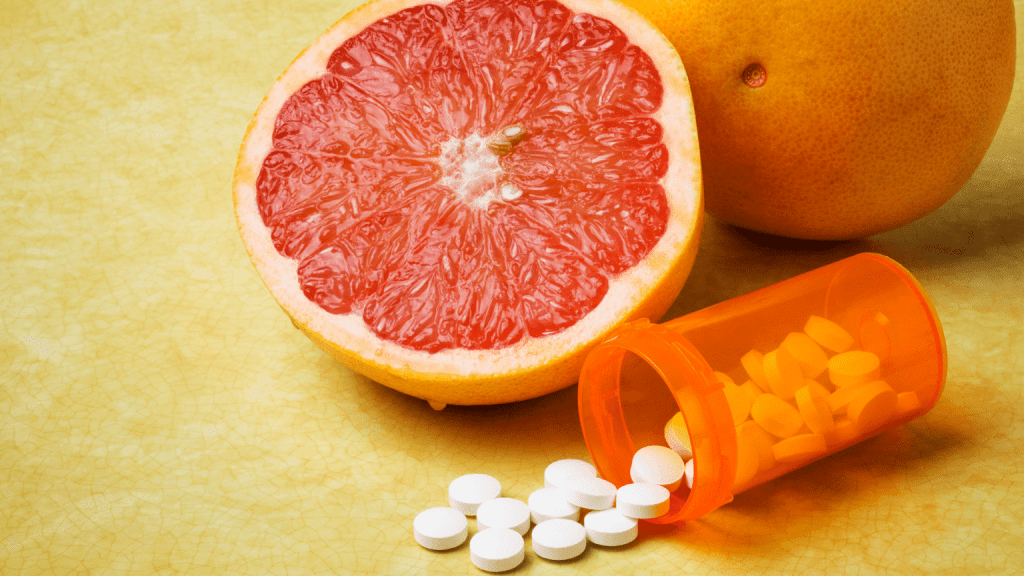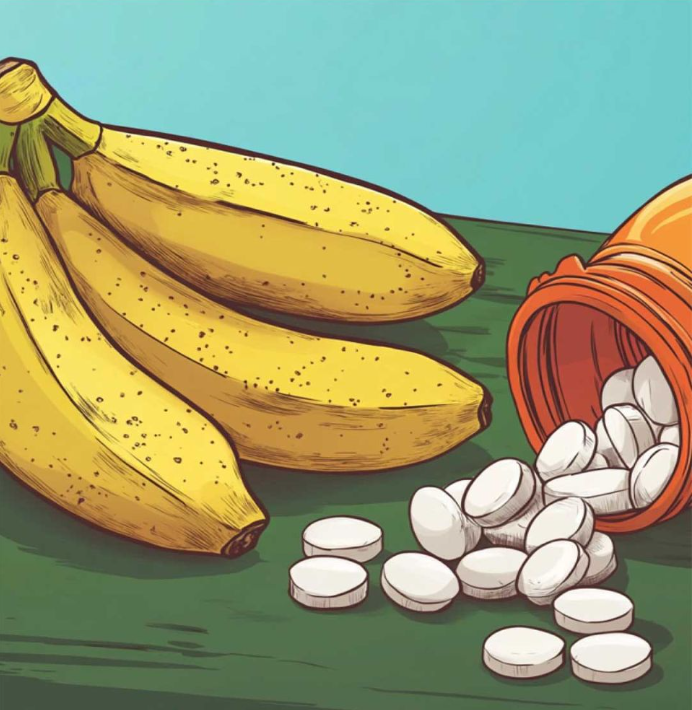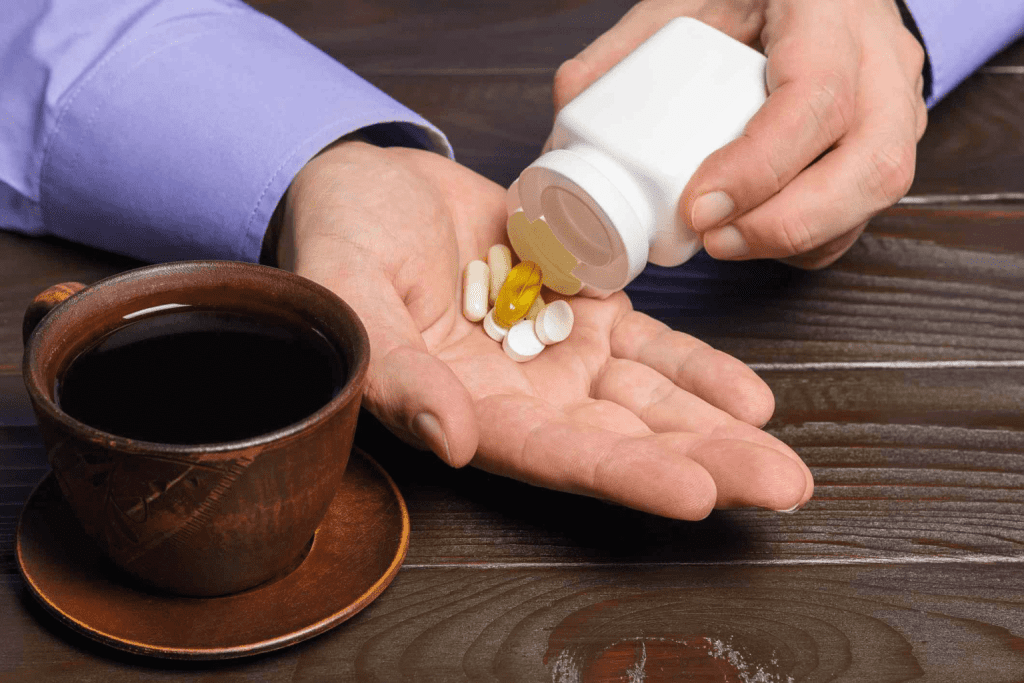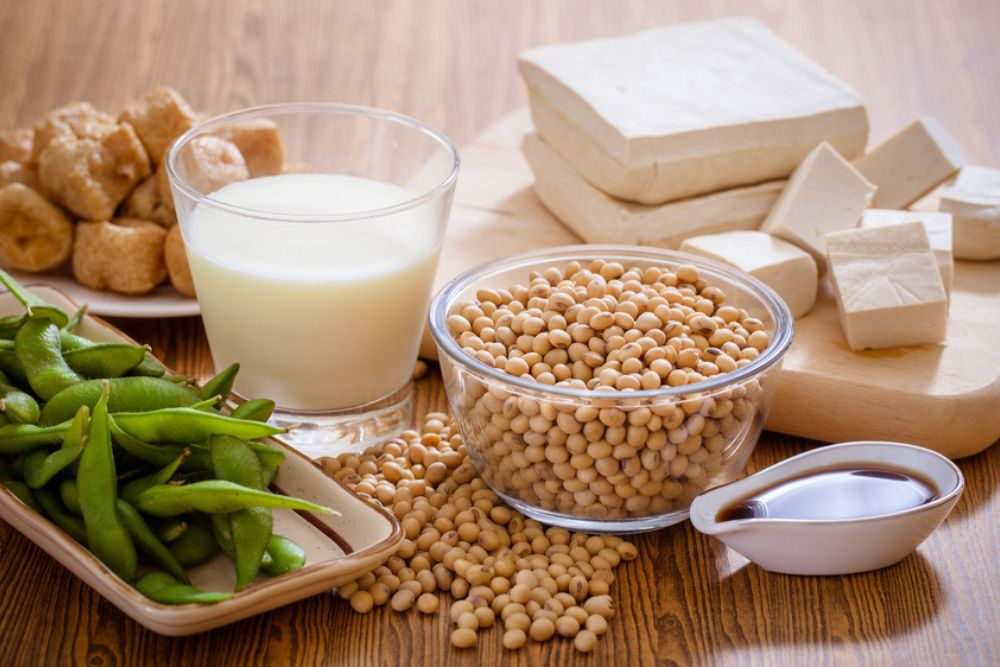When it comes to your health, understanding the interactions between foods and medications is crucial. Certain foods can interfere with the effectiveness of medications, leading to dangerous side effects or reducing the benefits of your treatment. Knowing which food and medication combinations to avoid can help you manage your health more effectively. Let’s explore some common foods and medications that don’t mix well and why these combinations can be risky.

1. Grapefruit and Cholesterol-Lowering Drugs (Statins)
Grapefruit is known for its tangy flavor, but it can cause serious issues when paired with certain medications, especially statins used to lower cholesterol.
- Why It’s Dangerous: Grapefruit contains compounds that inhibit enzymes responsible for breaking down statins in the body. This increases the drug’s concentration in the bloodstream, potentially leading to severe muscle pain, liver damage, or kidney failure.
- What to Do: If you’re taking a statin like atorvastatin or simvastatin, avoid grapefruit and its juice. Opt for other fruits like oranges or apples that won’t interfere with your medication.
2. Leafy Greens and Blood Thinners (Warfarin)
Leafy greens, like spinach and kale, are packed with nutrients, but they can pose a problem for people taking blood-thinning medications such as warfarin.
- Why It’s Dangerous: These greens are high in Vitamin K, which promotes blood clotting. Consuming large amounts of Vitamin K-rich foods can reduce the effectiveness of warfarin, increasing the risk of blood clots.
- What to Do: You don’t have to eliminate leafy greens entirely, but it’s important to maintain a consistent intake. Speak to your doctor about an appropriate amount that won’t interfere with your medication.
3. Dairy Products and Certain Antibiotics
Milk, cheese, and yogurt are healthy additions to many diets, but they can interfere with the absorption of certain antibiotics, particularly tetracycline and ciprofloxacin.
- Why It’s Dangerous: Calcium in dairy products binds to these antibiotics, making it difficult for your body to absorb them effectively. This reduces the antibiotic’s ability to fight infections.
- What to Do: Take these antibiotics with water and avoid consuming dairy products within two hours of your medication to ensure the drug’s effectiveness.
4. Bananas and Blood Pressure Medications (ACE Inhibitors)
Bananas are rich in potassium, a mineral that helps balance fluids and electrolytes in the body. However, combining them with ACE inhibitors used to treat high blood pressure can lead to an overload of potassium.

- Why It’s Dangerous: ACE inhibitors, like lisinopril and enalapril, increase potassium levels. Eating too many potassium-rich foods can lead to hyperkalemia, a condition where excess potassium in the blood can cause heart problems.
- What to Do: Monitor your potassium intake and limit foods like bananas, oranges, and potatoes if you’re taking ACE inhibitors. Consult your doctor for a list of foods to avoid.
5. Alcohol and Pain Relievers (NSAIDs and Acetaminophen)
While having an occasional drink might seem harmless, it can lead to dangerous complications when combined with pain relievers such as NSAIDs (ibuprofen, aspirin) and acetaminophen.
- Why It’s Dangerous: Alcohol amplifies the side effects of these medications. Combining alcohol with NSAIDs can increase the risk of stomach bleeding, while mixing it with acetaminophen can cause severe liver damage.
- What to Do: Avoid drinking alcohol when you’re taking these pain relievers. If you need to drink, talk to your doctor about safe alternatives or limit your intake to reduce the risks.
6. Chocolate and Antidepressants (MAOIs)
For people taking monoamine oxidase inhibitors (MAOIs) to treat depression, indulging in chocolate can be risky due to a compound called tyramine found in chocolate.
- Why It’s Dangerous: Tyramine can lead to dangerously high blood pressure when combined with MAOIs. This can result in a hypertensive crisis, which requires immediate medical attention.
- What to Do: Avoid foods high in tyramine, such as chocolate, aged cheeses, and cured meats, if you’re on MAOIs. Check food labels, and consult your doctor about specific foods to avoid.
7. Coffee and Certain Antidepressants
Coffee is a popular way to start the day, but it doesn’t mix well with certain medications, especially some antidepressants like lithium.

- Why It’s Dangerous: Caffeine in coffee can reduce the effectiveness of lithium and other antidepressants. It can also interfere with the absorption and metabolism of these drugs, potentially leading to an increase in side effects.
- What to Do: Limit your caffeine intake if you’re on these medications. Opt for decaffeinated coffee or caffeine-free herbal teas to reduce potential interactions.
8. Licorice and Blood Pressure Medications
Licorice is a popular ingredient in teas and candies, but it contains glycyrrhizin, a compound that can interfere with certain blood pressure medications.
- Why It’s Dangerous: Glycyrrhizin can cause potassium levels to drop, leading to an increase in blood pressure and counteracting the effects of medications like diuretics and ACE inhibitors.
- What to Do: Avoid licorice if you’re on blood pressure medications. Look for alternatives like peppermint or ginger tea if you enjoy herbal beverages.
9. Soy Products and Thyroid Medication
Soy products like tofu, soy milk, and edamame are excellent sources of protein, but they can reduce the effectiveness of thyroid medications such as levothyroxine.

- Why It’s Dangerous: Soy can interfere with the absorption of thyroid medication, making it more challenging to manage conditions like hypothyroidism. This can lead to symptoms like fatigue, weight gain, and depression.
- What to Do: If you consume soy products, try to take your thyroid medication several hours before or after eating soy. Consult with your doctor for specific guidance on timing.
10. Cranberry Juice and Blood Thinners
Cranberry juice is often consumed for its potential urinary tract benefits, but it can interact dangerously with blood thinners like warfarin.
- Why It’s Dangerous: Cranberry juice can enhance the blood-thinning effects of warfarin, increasing the risk of excessive bleeding. The interaction can be unpredictable, so it’s best to avoid cranberry products altogether.
- What to Do: Skip cranberry juice if you’re on warfarin or other blood-thinning medications. If you enjoy fruit juices, opt for options like apple or grape juice that don’t interfere with blood thinners.
Conclusion: Being Mindful of Food and Medication Interactions
Understanding food and medication interactions is essential for anyone managing a health condition. Certain foods can reduce the effectiveness of medications, while others can lead to dangerous side effects. By being aware of these combinations, you can make informed choices that support your health and ensure your medications work effectively. If you’re ever in doubt, consult your doctor or pharmacist to help you navigate these interactions safely and avoid potential risks.


